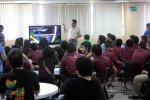Year end fundraising effort, Mexicali migration and Sugar Camp Lima
Since we started our donating program a year and a half ago, and the membership program a year after that, we already demonstrated what an awesome community we have. We currently have around 30 members and donations keep going up. Thanks so much!
But still, we are very far from our goal of having 100 supporting members before 2012. If you are still not a member, we compel you to join in and help make this project economically self-sustained. And if you are a member, we ask you to brag about it as much as you can! Tell others about the project, ask fellow users to join, write about it in your blogs and social palatforms, be Trisquel ambassadors.
By the way, we will soon be adding a new benefit to the membership, a XMPP/Jabber account matching the alias email address.
Trisquelizing in Mexicali, BC, México
This past october 20th an installfest took place at the Instituto Tecnológico de Mexicali (ITM), during its 30th anniversary. The free software installation party was a joint effort of José Luis Juárez Viveros, Luis Vega and Fernando Michel, as well as the Open Source Mexicali group and the support from the computer systems engineering students.
During the day, students from the different courses at the ITM assisted to install in their computers the Trisquel GNU/Linux operating system, as they did during the conferences “Aprender y emprender con Software Libre” by Daniel Rodríguez and "El cambio de paradigma entre el software como servicio y la cultura hacker” by Jacobo Nájera.
Sugar Camp Lima, November 2011
We recently collaborated with the Peruvian Sugar community by assisting to the Sugar Camp event in Lima, where Trisquel's project director stayed for a week. This are his impressions on the hackaton:
I'll try to sum up some highlights from the SugarCamp event in Lima. I'd like to start by thanking the Escuelab people for inviting me to the event, and SugarLabs for very generously providing me the plane tickets. I hope it was worth it :)
My main job during the hackathon was to finish up TOAST using Sweets 0.94. That system was used as a testing environment, since Trisquel images are easy to make and run. Locale support for aym_PE and quz_PE was added, and scripts were written to fetch the latest Quechua and Aymara translations during build, allowing to make new isos every time the translators need to check if new strings have the proper context. Many thanks to Alsroot for all his help!
The current image can be downloaded from here: http://devel.trisquel.info/sugar/toast/iso/
Build scripts and files: http://bzr.trisquel.info/makeiso/branches/toast
During that process many small achievements were reached too, like fixing some bugs and testing the support for LTSP thin client environments. LTSP was used to show translators the results of their work -which by the way was a very emotive moment in an event filled with passion- and shown to deployers as an affordable way to recycle old computers and simplify maintenance.
On the non-technical aspects, getting to work in this camp gave me the opportunity to better understand the Sugar and OLPC projects and the many difficulties they have to overcome in real-life deployments. Getting to know Peruvian teachers and hackers showed me how we are taking too many things for granted, like the fact that in many cases schools don't have internet connection, -and when they do it is usually not enough to download iso images-. To fix this we are starting a project to make a fully self-contained installer, including all Trisquel editions -providing TOAST and GNOME environments among others-, and a set of miscellaneous packages which should allow to install school servers and provide a catalog of educational programs outside Sugar.
I also spent some time in graphically documenting the hackathon, recording many videos with which I intend to make a documentary short, and also taking some photos that can be found in my blog: http://quidam.cc/fotos/24-11-2011/sugarcamp-lima
On a personal level, I like to think I helped a bit with the negotiations which should now be leading to a pilot experiment in Puno to allow local communities leverage the effort in deployment of XO machines, which needed the help and trust of the government to let them modify software images and get them signed. One of the ideas discussed there was how deployment calendars should match development cycles for both Sugar and the distributions which support it, and the idea of having long term support releases for Sugar.
I had the most amazing experience of getting to know many Peruvian hackers who I wish we will now be able to provide better fitting software and documentation. I have to say that Escuelab astonished me, it is six floors of pure hacker goodness, sustained by very committed people with more will than resources. I am also very happy that I got to know three Sugar hackers so skilled and involved that now I know the only possible outcome for the project is success.
I will miss you all.
Ruben.




